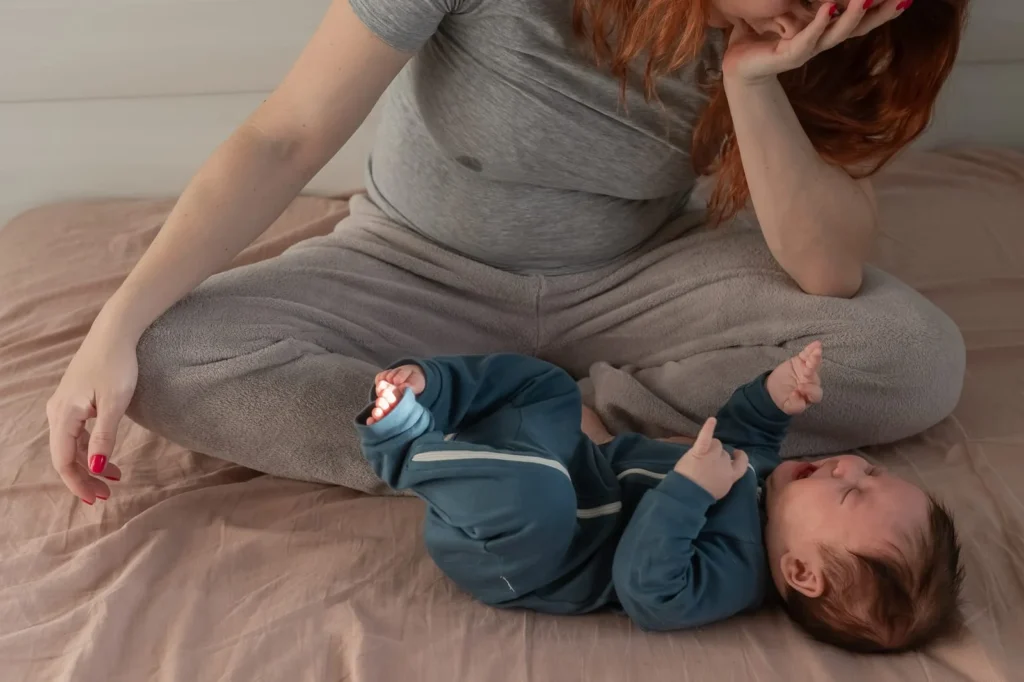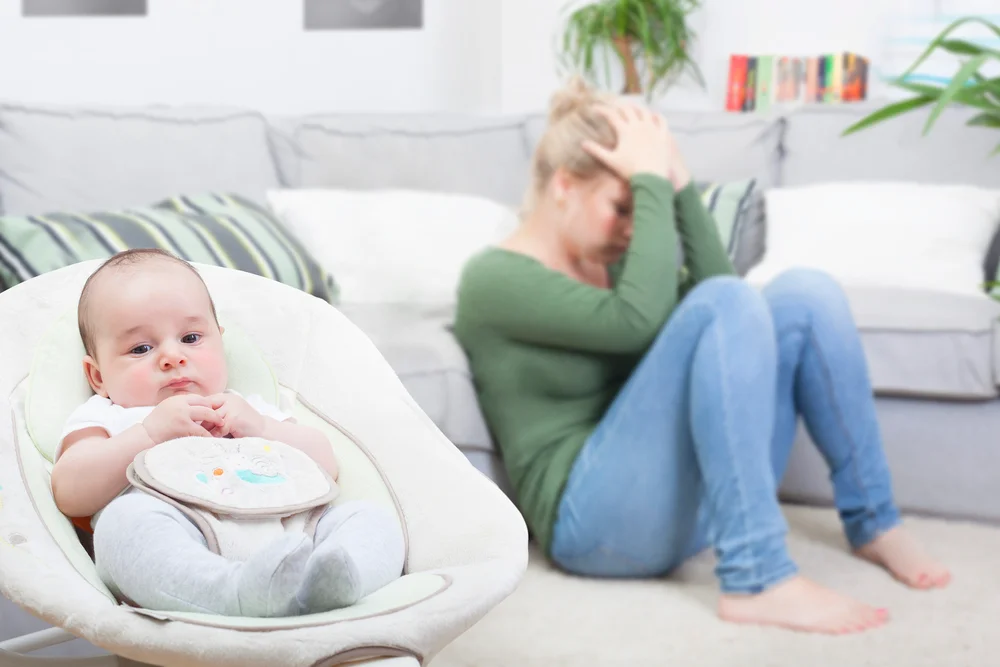Having a child is considered a significant stressor for women physically, emotionally, and socially. The first few days to a few weeks after childbirth, women experience mild mood swings or depression, referred to as the post-baby blues. Some women develop PTSD, postpartum depression, or postpartum bipolar disorder.
Bipolar disorder is a severe mental health disorder that does not currently have a cure but has several management options for symptoms. Many people struggle to correctly identify bipolar disorder symptoms, especially in the face of how common depressive episode symptoms are in other mental health conditions.
There are several multifaceted factors that can cause the development of postpartum bipolar depression. Things such as genetics put women at a higher risk of developing postpartum bipolar, but environmental factors can exacerbate that risk.
It is thought that between one to two women per 1,000 start to experience postpartum bipolar disorder within a few days or the first six weeks after giving birth.
There are a handful of mental health conditions that women are at risk of developing during the postnatal phase, many of which (like depression, anxiety, and bipolar disorder) have overlapping symptoms. For women, it can be challenging to recognize symptoms in themselves, especially when they are preoccupied with a new baby. That is why it is essential that families be involved in recognizing the symptoms and knowing how to help.
Thankfully, there are several forms of treatment that can help. The sooner women reach out for help, the sooner they can manage symptoms.

What is bipolar disorder?
Bipolar disorder is a mental health disorder. It is a serious mental health disorder that has no known cure at this time. Bipolar was previously referred to as manic depressive disorder. It is typically divided into bipolar I and bipolar II.
- Bipolar I Disorder: Commonly called manic depression disorder, it is when women struggle with at least one manic behavior i.e., very hyper activities and irritability
- Bipolar II Disorder: Similar to Bipolar I but with a mixture of more manic and depressive episodes.
Without proper treatment, the consequences can cause disruptions in daily life. New mothers, in particular, are at high risk of shifts in energy, which cause problems caring for themselves, caring for a new baby, sleeping, or handling other tasks.
It is not uncommon for people struggling with bipolar disorder not to realize that behavioral changes or mood swings are causing disruptions to their lives.
In fact, people who struggle with manic episodes are traditionally less likely to get help or see a need for help compared to those with depressive episodes. That said, it is also not uncommon for people to be misdiagnosed with a depressive disorder if they only seek help during depressive episodes. Women in the postpartum phase are often struggling with depressive episodes more than manic episodes.
What is postpartum bipolar disorder?
Traditional bipolar disorder affects an average of 2% of the female population, and those who have been diagnosed with any type of bipolar disorder are at a much higher risk of developing postpartum bipolar disorder. However, any woman, regardless of any history of other mental health diagnoses, can develop bipolar symptoms during the postnatal period, which refers to the first 12 months after a baby is born.
It is important to recognize postpartum symptoms and signs and to get help as soon as possible. It can be difficult to observe postpartum bipolar disorder symptoms and yourself, especially when you are dealing with a new baby, so it’s important that all family members understand the symptoms and what to do to best support their partner if they see increasing symptoms manifest.
Prevalence of postpartum bipolar
Women who have no history of any psychiatric illness before getting pregnant have a 2.6% prevalence of postpartum bipolar disorder.
20% of the same women struggle with bipolar-spectrum mood episodes during and after pregnancy, including depressive episodes, hypomanic episodes, manic episodes, and mixed episodes.
Postpartum mood (major depressive or manic) episodes with psychotic features affect from 1 in 500 to 1 in 1,000 deliveries and may be more common in women who are having their first child.
- The risk of postpartum episodes with psychotic features is more likely in women who have a history of psychotic mood episodes.
- That risk is also higher for women with a prior history of a depressive or bipolar disorder (especially bipolar I disorder).
- Women with a family history of bipolar disorders are at a higher risk of developing postpartum bipolar too.
After a woman experiences one bipolar episode, the risk of having postpartum bipolar symptoms for subsequent deliveries increases by an average of 40%.
Why understanding this condition is crucial for new mothers and their families
Understanding postpartum bipolar disorder symptoms and postpartum bipolar disorder treatment can give new mothers and their families the information they need to answer critical questions like “Can postpartum trigger bipolar?” or “How long does postpartum bipolar disorder last?” while also knowing what measures can be taken for at-home treatment measures.
Bipolar disorder can significantly impact your ability as a new mom to care for yourself or your baby. Mothers with postpartum bipolar disorder symptoms are at a higher risk of harm to themselves or their babies, especially if the episodes become psychosis.
- You should learn when to seek help from professionals.
- You and your family should learn about effective treatments, especially if you are breastfeeding.
- You should know when to seek emergency help.
Helping a Family Member
If you are a friend or family member of a new mom who is struggling with this condition, there are several things that you can do, including listening, providing information, and directing them toward the right type of professional care when the time is right.
- Encourage women to talk about how they are feeling and what their symptoms are
- Explain that postpartum bipolar disorder is manageable with the right treatment.
- Provide women with high-quality information on the condition, preferably from an authoritative source.
- Offer information on helplines if there is an immediate need.
- Encourage women to talk to their primary care doctor or other mental health professional to get help.
- Encourage women to use other support and services, including calling on family to do things like cook or clean or join online support groups for women struggling with postpartum disorders.

Postpartum bipolar disorder symptoms
Postpartum bipolar disorder symptoms involve one or two episodes. As the name suggests, individuals with this condition experience extreme or bipolar episodes:
- First are depressive episodes that result in symptoms very similar to a depressive disorder.
- Second are manic episodes that result in symptoms of mania with elevated mood and high energy levels.
Symptoms of both are summarized in the table below:
Common Depressive Symptoms | Common Manic Symptoms |
Uncharacteristic moodiness | High energy levels |
Irritability | Over-activity |
Pulling away from friends and family | Increased spending |
Lack of interest in pleasurable activities like exercise, eating, or sex | Reckless behavior |
Staying awake throughout the night | Uncharacteristically high sex drive |
Not able to do personal or professional responsibilities | Decreased sleep |
Increased fatigue or chronic, unexplained pain | Grandiose ideas |
Thoughts of harming the baby or suicidal thoughts | Hallucinations or delusions |
Depressive Episodes
Depression is a common struggle for women during pregnancy and immediately after giving birth.
If depression symptoms are experienced within the first few days of giving birth, it is often attributed to “baby blues,” something that results from a significant change in hormones and sleep quality.
Women are at risk for:
- Postpartum Anxiety
- Postpartum depression
- Postpartum psychosis
- Postpartum bipolar disorder
- Postpartum schizophrenia
- Postpartum borderline personality disorder
- Postpartum eating disorders
Given how many conditions women are at risk for, some of which are based on mental health history, it is important to recognize bipolar disorder symptoms.
So, when are the symptoms attributed to a depressive episode?
Some common symptoms include the following:
- You find yourself constantly looking at things in a negative fashion
- You always worry that things are worse than they are
- You have a strong over the health of your baby
- You find yourself struggling with hopelessness
- You find it difficult to take care of yourself or your baby
- You need constant reassurance
Manic Episodes
Immediately after giving birth, you might experience great elation that also stems from the change in hormones and from the exciting new experience of having a baby, particularly for first-time mothers.
But when do episodes of high energy levels get attributed to postpartum bipolar disorder symptoms?
With manic episodes, new mothers are likely to struggle with excessive energy that makes them do a lot of activity in a rush around the house. It’s not uncommon for mothers with Manic symptoms to have strong self-worth that is outside of their normal character and to think that they can do anything.
During these episodes, individuals will likely have such high energy that they don’t sleep or think that they even need sleep, which can be very detrimental, particularly when taking care of a new baby.
It’s not uncommon for women to start behaving in an unusual way, struggling with racing thoughts, going out on spending sprees, and showing other unusual changes that can include:
- Hallucinations
- Delusions
- Grandiose ideas like being an expert on everything
- Paranoia
Multifactorial causes of bipolar disorder
Bipolar disorder is considered a multifactorial disorder. This means it has multiple factors that cause the disorder.
Bipolar disorder has a strong genetic risk. Genetics is one of the strongest causes. Patterns of bipolar I disorder have little genetic difference, but bipolar II disorder is more likely to affect women.
For bipolar II disorder, multifactorial causes can include:
- Genetic factors
- Physiological factors
- Co-occurring disorders
- Postpartum period
The risk of bipolar II is often higher in individuals who have relatives with the same disorder. For example:
Margaret’s mother has bipolar II disorder, so she is at a higher risk of developing the same condition. Janice’s mother has a major depressive disorder, which means Janice is not at the same high risk as Margaret for bipolar II, but she is for bipolar I.
That said, there are also several environmental factors that influence the onset of bipolar disorder.
This means there is a strong relationship between environment and genetics. Things like childhood trauma, a history of depression, and having a child can all influence the risk of bipolar diseases, particularly postpartum bipolar disorder.

Can postpartum trigger bipolar disorder?
Childbirth can be a specific trigger for bipolar II disorder, particularly for hypomanic episodes, which occur in between 10%-20% of females in the early postpartum period.
Postpartum hypomania can foreshadow potential postpartum depression, something that occurs in nearly 50% of all females.
If you, as a new mother, have previously been diagnosed with a bipolar mood disorder, depression disorder, anxiety disorder, or other mood disorder, it increases your chance of having manic or depressive symptoms after you give birth.
While the main features of bipolar disorder have to do with either manic and/or depressive symptoms, most women who experience postpartum bipolar disorder symptoms will struggle primarily with depressive symptoms.
How long does postpartum bipolar disorder last?
The potential duration of postpartum bipolar episodes can be highly variable, depending on the individual.
Mental Health History
Your mental health history, such as any experiences with previous disorders or diagnoses, might contribute to how long your postpartum bipolar disorder lasts or how severe the episodes are.
Understanding what your history is and how symptoms might overlap can help you and your family recognize when it’s time to get help.
When You Get Help
Far too often, mothers who experience mental health issues after having a new child hesitate when it comes to getting help. Upon reflection, many people who get help down the line wish that they had salt treatment much sooner.
It can be challenging to recognize that crying, mental fog, and sleep disruptions are actually signs of a severe disorder rather than normal aspects of being a new mother. Lack of knowledge or confidence in reaching out and talking about symptoms can delay a diagnosis and subsequent treatment. This can ultimately make the postpartum bipolar disorder symptoms last significantly longer than they need to.
When you get help, it can make a huge difference in how long your postpartum bipolar disorder episodes last. The sooner you get help, the faster you can get treatment without letting symptoms worsen.
Postpartum bipolar disorder treatment options
There are no specific ways to diagnose bipolar disorder, but a doctor will likely conduct several exams, including:
- A physical health exam
- Charting your mood with a psychiatrist
- Sleep assessments
- A mental health exam during which a psychiatrist will talk to you about behavioral or thought patterns
A proper diagnosis is important because, as mentioned, there are several postpartum mental health conditions from which mothers can struggle. Having the right diagnosis makes it possible to find the best treatment.
It is equally important in this case because bipolar disorder in the postpartum time frame can mimic symptoms of anxiety or depression.
There are a few course modifiers for those who struggle with any form of bipolar disorder, including postpartum depression. Course modifiers are things that can modify the potential outcome for symptoms and management.
- The more education someone has, the better their potential outcome because education can be empowering and help individuals and their families know what they can do to manage symptoms.
- Fewer years of illness are equally important modifiers for bipolar disorder.
- Those who are married have been independently more likely to have a functional recovery, indicating that family support is a critical modifier for the outcome of bipolar disorder.
Given the multifactorial causes of bipolar disorder, particularly postpartum bipolar disorder, the postpartum bipolar disorder treatment is multifaceted, too. Treatment for postpartum and bipolar disorder should include:
- Medication
- Therapy
- Lifestyle adjustments
The sooner you can get a diagnosis and treatment, the better your management will be.
Medication
Medication for any type of bipolar disorder centers on mood stabilizers. Mood stabilizers can help reduce the recurrence of your symptoms. Lithium is one of the most common mood stabilizers, although if you are breastfeeding, it is often not recommended. It is also not recommended for mothers who are still pregnant.
There are alternatives that are safer. You can also talk to a professional about antidepressants, which can help with the symptoms of depressive disorders.
For those mothers who are also experiencing psychosis, antipsychotic medications might be used in conjunction with mood stabilizers and therapy.
- Antidepressants: Antidepressants can be safely used when you are breastfeeding if you take SSRIs. However, your doctor might suggest tricyclic antidepressants if you have had any type of depressive disorder in the past, and these have worked well for you.
- Antipsychotics: Clozapine and other antipsychotics can be safely used for breastfeeding mothers. Some antipsychotic medications can cause weight gain, so if you are concerned about managing your weight as a new mother, this is something to talk about with your doctor or other health professional.

Therapy
Talk therapy is an important part of postpartum bipolar disorder treatment. Talk therapy can help you recognize and change automatic negative thoughts or emotions related to things like depression or anxiety.
Common therapies include cognitive behavioral therapy, which helps you catch illogical thoughts that are contributing to your emotional state and replace them with positive, logical thoughts. This helps you change how you react to situations and avoid letting certain stressful elements or thoughts worsen your symptoms.
Other forms of therapy, like interpersonal therapy, can help you find better ways to connect and overcome challenges as a new mother. There are several forms of treatment that involve group settings as well as individual settings.
Family therapy can be an important way to incorporate your partner, spouse, or other family members in finding good ways to support you as you recover.
Lifestyle adjustments
Studies indicate that lack of sleep and hormonal fluctuations that come from childbirth can also pose a risk of developing postpartum and bipolar disorder.
Some work has concluded that sleep loss triggers episodes of mania, an essential predetermining factor in the development of full postpartum bipolar disorder.
Women with severe sleep deprivation leading to manic episodes experienced postpartum psychosis at a rate of two times that of other women.
As such, knowing the importance of good sleep means women and their families should incorporate ways to help the new mother get adequate sleep. This can include:
- Good sleep hygiene
- Taking turns with nighttime feedings so the new mother isn’t doing it all
- Having family take turns babysitting so the new mom can take naps.
- Finding moments to relax and use self-care as a new mother
- Finding ways to exercise during the day to encourage better sleep quality
Other lifestyle adjustments can extend to diminishing stress as a new mother, reaching out for help with socialization, and managing symptoms of coexisting mental health disorders if you have them.
Women who are struggling with depressive episodes, for example, can make lifestyle adjustments based on things learned during therapy, like CBT. Some tips include the following:
- Try to incorporate regular exercise to help regular mood and improve sleep
- Focus on healthy meals, which might be something that a family member provides or that you use a food delivery service for, as the food you eat can boost your mood and help with cognition
- Use journaling where you can to write down emotions and look for patterns of thought, especially if you are struggling with negative automatic thoughts
- Set time aside for self-care, whether that is taking a nap, going for a walk, calling a friend, or reading a good book
- Incorporate meditation and mindfulness practices, especially when symptoms crop up or before you go to bed
Summing Up
There can be many difficulties in diagnosing the condition, including symptom overlap with other postpartum mood disorders. However, early detection and treatment can improve outcomes for mothers and families. If you or someone they know may be experiencing symptoms of postpartum bipolar disorder, don’t be afraid to reach out for help today.